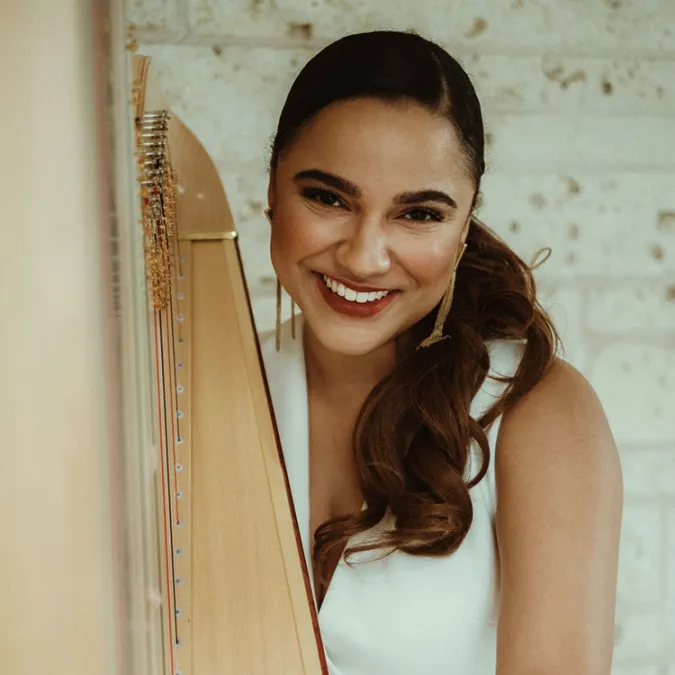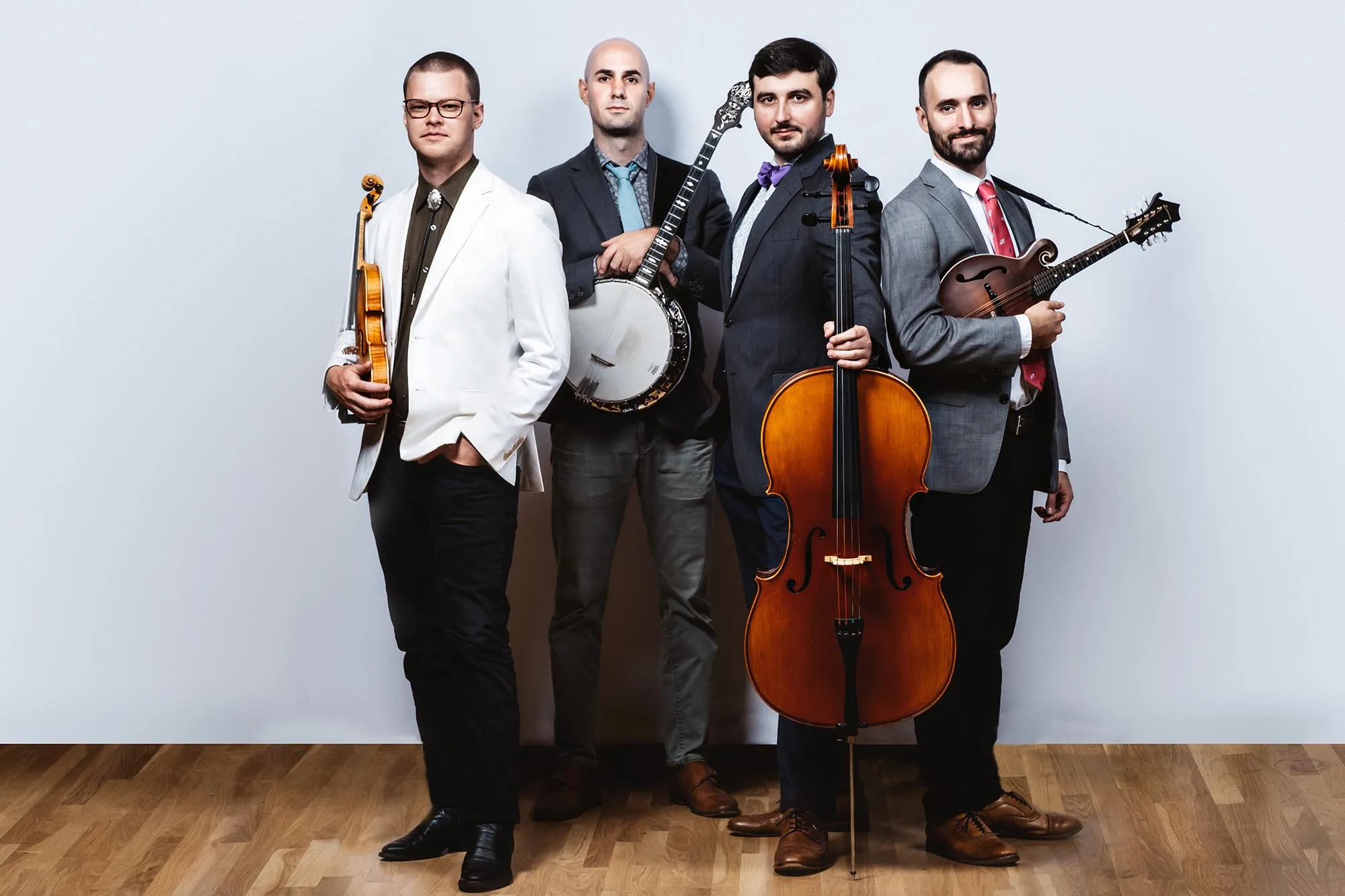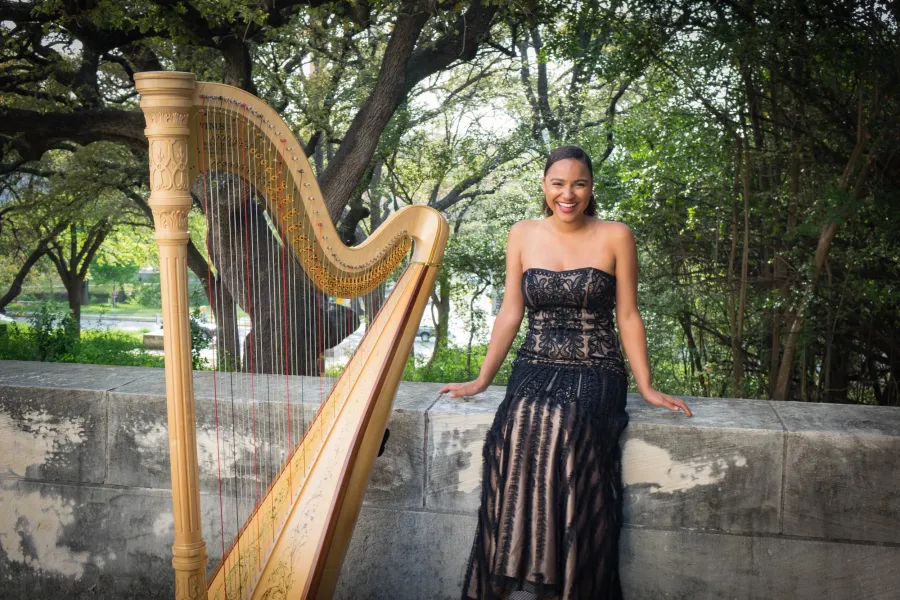Asriel Davis, piano & organ
Invoke String Quartet
Ebonee Thomas, flute
This concert will last about 90 minutes with one intermission.
Please silence your electronic devices.
Photography, video, or recording of any part of this performance is prohibited
Program
James Weldon Johnson
arr. Younger
Lift Ev’ry Voice and Sing
Florence Price
trans. McHenry
Meditation
Sketches in Sepia
Retrospection
intermission
William Grant Still
Ennanga
Moderately Fast
Moderately Slow
Moderately Fast
Asriel Davis, piano
Invoke String quartet
Romance
Ebonee Thomas, Flute
Maurice Draughn
A Canon of Peace
Asriel Davis, organ
About the Program
Telling Their Stories is a recital performed on harp centered around African-American artists/composers and the stories of their musical journeys and lives. The program will travel chronologically, indulging the audience through sound and story telling to highlight the artistry of the composers and transcribers/arrangers programmed.
Program notes by Mark Bilyeu
James Weldon Johnson
Lift Ev’ry Voice and Sing
Born June 17, 1871, Jacksonville, FL
Died June 26, 1938, Miscasset, ME
Composed 1900
Premiered February 12, 1900, Stanton School, Jacksonville, Florida
Duration 4 minutes
Often referred to as “The Black National Anthem,” “Lift Every Voice and Sing” was penned by the NAACP leader James Weldon Johnson in 1900, his brother John Rosamond Johnson set the poem to music. The duo set out to craft something to celebrate Abraham Lincoln’s birthday. As James recounted, the first phrase came immediately, but the rest of the stanza was more difficult, until a moment of inspiration: “I paced back and forth . . . repeating the lines over and over to myself, going through all of the agony and ecstasy of creating. . . . I could not keep back the tears . . . I was experiencing the transports of the poet’s ecstasy. Feverish ecstasy was followed by that contentment—that sense of serene joy—which makes artistic creation the most complete of all human experiences.” The song’s first performance was by a choir of 500 schoolchildren at the segregated Stanton School in Jacksonville, Florida, where James Weldon Johnson was principal. According to the NAAPC: “At the turn of the 20th century, Johnson's lyrics eloquently captured the solemn yet hopeful appeal for the liberty of Black Americans. Set against the religious invocation of God and the promise of freedom, the song was later adopted by NAACP and prominently used as a rallying cry during the Civil Rights Movement of the 1950s and 1960s.”
Florence Price
Meditation
Born April 9, 1887, Little Rock, Arkansas
Died June 3, 1953, Chicago, Illinois
Composed ~1929
Duation 2 minutes
Sketches in Sepia
Composed 1947
Duration 3 minutes
Retrospection
Duration 4 minutes
Born in Arkansas, Florence Price attended the New England Conservatory —one of the few schools which accepted African American students— and returned to Arkansas where she taught at the university level. Concerned with the escalating racial tensions under Jim Crow, she and her family moved to Chicago in 1927, where Price’s career flourished as a performer, teacher, and composer. Her exquisite miniatures “Sketches in Sepia,” “Meditation” and "Retrospection" instantly show her skill to write beautiful melodies, alongside her ability to craft music that layers her own unique voice (that many are still not familiar with!) on top of musical structures that would put Schubert at ease. The first two, dated after her move north, are in ternary form (that is: ABA) like so many of the classical dance idioms she had studied and taught during her career, but utilizes harmonic language and idioms that she heard in the jazz clubs of New York and Chicago during the Harlem Renaissance. “I have an unwavering and compelling faith that a national music, very beautiful and very American, can come from the melting pot,” she wrote, “just as the nation itself has done.” "Retrospection" a short and quiet meditation originally written as a pair of works for solo organ was first titled "An Elf on a Moonbeam."
William Grant Still
Ennanga
Born May 11, 1895, Woodville, MS
Died December 9, 1978, Los Angeles, CA
Composed 1956
Premiered October 12, 1958, Westside Jewish Community Center, Los Angeles, CA, Lois Adele Craft, harpist
Duration 20 minutes
Romance
Composed 1954
Premiered 1954, Sigurd Rascher, saxophone
Duration 6 minutes
“In the beginning of my musical career,” wrote William Grant Still in the American Harp Journal, “I had been fascinated—but also frightened—by the harp.” The 1974 article was entitled “On Composing for the Harp,” and in it, he described his hyper-awareness about his lack of harp knowledge, and his need to consult many harpists in the crafting of his 1958 work for harp and piano Ennanga. “Without the help of Carlos Salzedo’s book, Miss [Edna] Phillips, Mrs. [Ann Mason] Stockton, Miss [Lois Adele] Craft, and Mrs. [Mary Sevitzky] Portanova, I could not claim to be a composer for the harp. Without them, I probably would never have used the harp except as a part of ensembles,” he explained. “In that sense, Ennanga has marked a true collaboration between creator and performers.” The three-movement work takes loose inspiration from its namesake: an African bowharp also known as a Ganda harp, although Still was quick to explain that it was not his purpose “to approximate the sounds of [the bowharp] in any way ... merely to identify the music with its inspirational source by the use of the name.” The work has several versions of accompanying forces, which were all crafted at the same time, including a version for harp and full orchestra. As Still recalls, “...But probably one of the most valued comments on the work came after Miss Craft had played it with orchestra in a Southern California concert. A young man from Uganda came backstage to say that he recognized the word “ennanga” as belonging to his people, that he felt a kinship with the music, and that it reminded him of home. For him, at least, the music had accomplished its purpose.”
Romance, was written just two years before Ennanga, and was originally scored for saxophone and piano, as one of only four works by Still to feature a solo instrument and piano. Although he intended to write several more pieces to complete a multi-movement work for saxophone, that never came about, and so we are left with this stand alone movement.
Maurice Draughn
A Canon of Peace
Born 1979
Composed 2021
Duration 3 minutes
Harpist Maurice Draughn, a native of Detroit, has appeared as a soloist with several orchestras including the International Symphony, Rochester Symphony, Plymouth Symphony, Michigan Philharmonic and the Detroit Symphony Civic Orchestra. He also appeared in performances with legendary artists such as Aretha Franklin, Ray Charles and Stevie Wonder. His 2021 work “A Canon of Peace” is inspired by the Biblical quote from Jesus Christ found in John 14:27: “Peace I leave with you; my peace I give you. I do not give to you as the world gives. Do not let your hearts be troubled and do not be afraid,” and weaves a meditation of serenity with a cyclical use of the opening seven-measure motive.
About the Artists
Mallory McHenry

Dr. Mallory McHenry is a dynamic harpist, educator, and arts advocate based in Austin, Texas. She serves as lecturer of harp at The University of Texas at Austin’s Butler School of Music and assistant professor of music at Southwestern University. Dedicated to music education, she directs the harp program for the Round Rock Independent School District, guiding more than 40 young harpists, and co-directs the young artist harp seminar (YAHS) at Kenyon College. An accomplished performer, McHenry has appeared as soloist with the Dallas Symphony Orchestra and performs regularly with the Dallas Winds and U.S. Air Force Band of the West. She has also collaborated with the Austin Symphony, Waco Symphony, Valley Symphony, and others, and presented recitals and lectures for the American Harp Society, Mu Phi Epsilon and many acclaimed Colleges and Universities. Beyond the harp, McHenry is a touring member of the Jason Max Ferdinand Singers, serving as creative director and director of education advancement, with appearances at Saturday Night Live, the Kennedy Center, and the 2023 National ACDA Conference. Her advocacy and research center on equity in classical music, particularly the legacies of Black women composers, highlighting their influence through original harp transcriptions.
Asriel Davis

Asriel is an award-winning organist, composer, and arranger, recognized in 2023 by The Diapason magazine as one of the “20 Under 30” top young organists in the U.S. He holds a Master’s degree in Organ Performance from Syracuse University, where he deepened his technical skills, expanded his sacred and classical repertoire, and cultivated a servant-leader approach to music. A published composer with GIA Publications as of 2025, Asriel’s works contribute meaningfully to the sacred music tradition. He has performed and toured internationally with renowned ensembles such as The Aeolians of Oakwood University and the Jason Max Ferdinand Singers, accompanying and playing across Europe, South Africa, the Bahamas, and beyond. From Baroque to modern, concert stage to sanctuary, Asriel remains committed to using music as a tool for healing, worship, education, and connection.
Ebonee Thomas

Thomas is the second flute and piccolo for The Dallas Opera, and has previously served as principal flute of the Knoxville Symphony, principal flute of the Florida Grand Opera, and second flute of the Houston Symphony. She spends her summers as a flutist at Lakes Area Music Festival and Music in the Mountains, and has been guest principal with symphonies and opera companies across the country. A passionate pedagogue, Thomas served as a member of the board of the Greater Dallas Youth Orchestras and is on the national advisory board of the Memphis Youth Symphony Program. She is also currently the piccolo committee chair for the National Flute Association. An avid chamber musician, Thomas has worked with the Austin Chamber Music Society and Voices of Change, a new music ensemble in Dallas. She recently made her debut performance with the ensembleNEWSRQ, a contemporary ensemble highlighting living and underrepresented composers. Thomas received her Bachelor of Music in flute performance from Southern Methodist University and her Master of Music from New England Conservatory of Music. She is a Burkart Piccolo Artist and plays on a Burkart Elite piccolo and 998 flute.
Invoke Quartet

Described as “...not anything but everything: Classical, Folk, Bluegrass, Americana and a sound yet to be termed seamlessly merged into a perfect one” (David Srebnik, SiriusXM Classical Producer), Invoke (Nick Montopoli, violin/banjo/vocals; Zach Matteson, violin/vocals; Karl Mitze, viola/mandolin/vocals; Geoff Manyin, cello/vocals) successfully dodges even the most valiant attempts at genre classification. The multi-instrumental quartet encompasses traditions from across America, including bluegrass, Appalachian fiddle tunes, jazz, and minimalism. Fueled by their passion for storytelling, Invoke weaves all of these styles together to form a unique contemporary repertoire, featuring original works composed by and for the group. Strings Magazine observes, "the remarkable string quartet Invoke has repeatedly proven one thing over its first 11 years: it simply cannot be contained by any one label." Invoke has shared the stage with many acclaimed chamber groups, including the Westerlies, Miró and Ensō Quartets, and the U.S. Army Field Band. Other highlights include performing in Carnegie Hall’s Weill Recital Hall, Lincoln Center, the Phillips Collection, and the Green Music Center, a concerto appearance with the Brevard Sinfonia, a residency at the Stanford Pre-Collegiate Institute, and performances on the NextNOW Festival at University of Maryland, and Festival Amadeus in Montana.
Event Details
$10 – 20
All University of Texas at Austin students are allowed one free ticket as long as they are available. Student tickets must be picked up at the Box Office with valid student I.D. Seating is unassigned.
If you are a patron with specific seating needs, please email tickets@mail.music.utexas.edu and we will reserve ADA seating for you.


